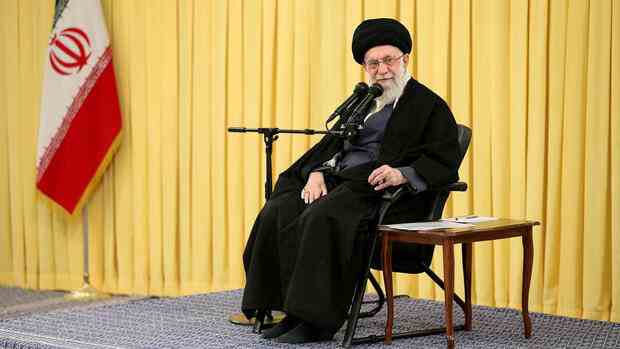The Iranian leader ordered sentence reductions for many protesters.
(Photo: via REUTERS)
Dubai Iran’s Supreme Leader has ordered an amnesty or prison sentence reduction for “tens of thousands” of people detained in connection with recent nationwide anti-government demonstrations, according to a media report. Ayatollah Ali Khamenei thus acknowledged for the first time on Sunday the extent of the action taken against the demonstrators.
The Khamenei decree is part of annual pardons ahead of the anniversary of Iran’s 1979 Islamic Revolution. The authorities have not yet announced how many people have been arrested because of the protests.
Khamenei has agreed to an amnesty and reduced prison sentences for tens of thousands “who have been accused and convicted in the recent incidents,” the state-run Irna news agency reported in Farsi. Irna’s English-language service later reported that the pardons and commutation of sentences applied to “tens of thousands of prisoners, including those arrested in Iran’s recent unrest.”
The discrepancy between the two reports was initially not resolved by the authorities. The names of pardoned persons were not mentioned.
The reports gave no reason for Khamenei’s move. He has the last word in all matters of state. However, the detention centers were already overcrowded before the most recent wave of arrests.
Several hundred people were killed during the protests
Activists rejected Khamenei’s decree. His “hypocritical pardon changes nothing,” wrote Mahmud Amiry-Moghaddam of the Oslo-based group Iranian Human Rights. Not only must all protesters be released unconditionally, but the public has a right to demand that those who “ordered the bloody repression and their agents” be held accountable, he said.
>> Read also: Iran denies IAEA allegations of clandestine modification of nuclear facility
Iran has been gripped by protests following the September 16 death of 22-year-old Mahsa Amini after her arrest by vice squads. Since then, the demonstrations have become one of the greatest challenges facing the Iranian theocracy. The collapse of Iran’s currency, the rial, against the dollar and the supply of Iranian drones to Russia for its war of aggression in Ukraine also caused public anger.
At least 527 protesters have been killed and more than 19,600 others arrested in recent protests, according to human rights activists in Iran. At least 16 people were also executed on charges related to the protests.
Official numbers have not been released for months. At least four people were executed in connection with the protests.
Meanwhile, an opposition politician who has been imprisoned for years has called for a referendum on a new constitution for the Islamic Republic. Mir Hussein Mousavi said in the appeal that the current system, which gives Ayatollah Khamenei the final say on all political issues, is no longer working. His demand was published by the opposition website Kaleme on Saturday evening.
Mousavi has been under house arrest for years
Mousavi called for the formation of a Constituent Assembly of “genuine representatives” of the people to draw up a new constitution. It was considered unlikely that the 80-year-old politician would get his ideas across to the Iranian theocracy.
He and his wife have been under house arrest for years after his controversial defeat in the 2009 presidential election sparked protests by the so-called Green Movement, which were crushed by security forces. However, he himself served the theocracy for decades.
Former pro-reform President Mohammad Khatami called for “free and competitive elections” after the release of political prisoners held and under house arrest. “Reformism has at least reached an impasse,” Khatami said in a statement circulated online. People have the right to be frustrated with this, as well as with the current system.
More: Iran apparently expands uranium enrichment almost to weapons quality
